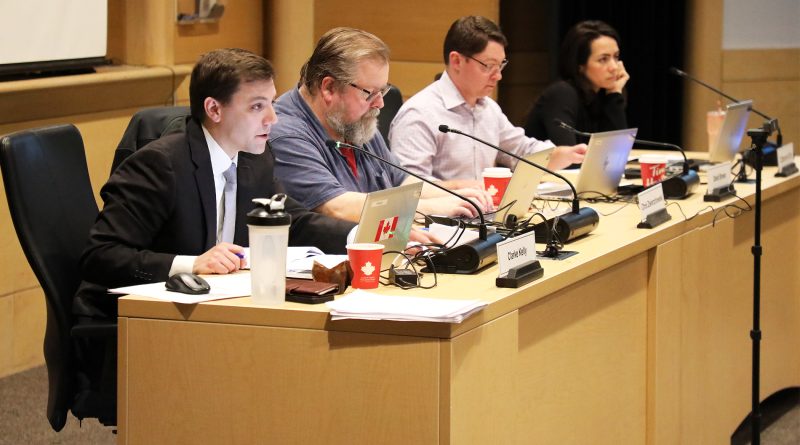Council briefs: Votes against Corkery quarry expansion, Zoning Bylaw draft, Economic development strategy update
CITY HALL – The Friends of the Burnt Lands (FBL) left this morning’s (April 16) City of Ottawa council meeting in a very good mood after council voted against a zoning amendment that would allow Thomas Cavanagh Construction to expand a quarry in to sensitive lands off March Road in the Corkery area.
The motion came to council after a long discussion at the Agriculture and Rural Affairs committee (ARAc) meeting April 3. Following 10 delegations, nine against the project and one in favour, the committee voted in favour of city staff’s recommendation to approve the zoning amendment at a 3-1 vote. The lone dissenter was Ward 5 Coun. Clarke Kelly and because of that no vote, the matter had to be discussed at the council meeting. Following the meeting, ARAc chair Coun. David Brown said he was impressed with the argument those opposed to the amendment put forward, which was echoed by other members of ARAc.
“I guess we have to lobby council as hard as we can,” FBL founder and Corkery resident John Blais told West Carleton Online after the meeting.
It must have worked.
“I would urge my colleagues that if we are confident in what we have in our Official Plan, that we stick up for that, and we refuse this application,” Kelly said in closing remarks. “If we have to, we go to the OLT (Ontario Land Tribunal) with the rationale that I’ve just laid out in the motion that I’ve provided today.”
“This morning, our councillor, Clarke Kelly, put forward a motion to turn down the zoning and official plan changes requested by Thomas Cavanagh Construction who wants to expand into more of the Burnt Lands Alvar,” Blais released in a statement following today’s council meeting. “Clarke laid out the reasoning behind this in his motion. The vote was 13 to 11 in favour of accepting the motion.”
Despite the vote, the battle isn’t over.
“That council decision will likely be objected to by Cavanagh and the matter will have to go to the Ontario Land Tribunal for a final decision,” Blais said. “So, indeed, we’ve won a battle, but the war is not over.”
This ongoing issue was entering its third year (and West Carleton Online has covered the issue since Day 1). Blais says the grassroots effort to oppose the expansion in to the sensitive Burnt Lands Alvar was impressive.
“A big thanks to everyone who wrote to the mayor and councillors; to everyone who wrote to the Environmental Registry of Ontario (ERO) three years ago; to everyone who appeared before the ARAc and gave a five-minute delegation; and a big thank you to Clarke who’s been on our side and fought this issue with us for three long years, and who brought us this victory,” Blais said. “Thank you, thank you, thank you. One of the councillors, in talking on this issue this morning, said he was especially moved by Chuck Commanda’s delegation and the indigenous teaching Chuck spoke of that says, ‘harvest only what you need.’ Miigwech, Chuck. We couldn’t have achieved this without the help of all of you.”
In other council news, the mayor and councillors received an update on the city’s Economic Development Strategy and Action Plan Implementation, including work on the Nightlife Economy Action Plan.
“All 10 recommendations in the Nightlife Economy Action Plan are underway,” city staff released in a statement following today’s council meeting. “As part of the inaugural Capital Music Week, the Nightlife Commissioner Office will host the Canada After Dark forum.”
This two-day event in May will bring together national and local officials, industry leaders and subject matter experts to discuss best practices for the growth and management of nightlife across Canada. The Nightlife Commissioner Office is also supporting work to establish new nightlife attractions and developing a nightlife website and safety plan that will be delivered later this year.
On the other initiatives, Council heard that:
- The province is providing the city with $18.5 million over three years as part of the Ontario-Ottawa Agreement to support economic development objectives and downtown revitalization.
- The city is working with Bloomberg Associates to identify solutions to overcome challenges and capitalize on new opportunities to drive economic growth and prosperity.
- The city is addressing challenges and barriers faced by main-street businesses and Indigenous, racialized and Francophone businesses through a small business needs assessment.
- City staff are working on two significant milestones: the 200th Anniversary of the founding of Bytown in 2026 and the ByWard Market in 2027.
- City staff are developing strategies to better attract, develop and retain a diverse workforce.
Council received the second draft of a new Zoning Bylaw for Ottawa.
“The report’s focus is on explaining key issues identified last year, during consultations on the first draft, and providing options to address them,” staff said.
The most significant changes proposed in the report address five key issues identified during public consultations on the first draft:
- Minimum parking rates in villages: While the second draft continues to propose no minimum parking rates, it also includes options for staff to consult on this spring which would require some minimum parking in rural villages.
- Maximum building heights in N1 and N2 Neighbourhood zones: The second draft reinstates three-storey height limits in suburban neighbourhoods to avoid reducing existing development rights.
- Conversion of R4 zones to N3 and N4 zones: In the first draft, all R4 zones were proposed to be zoned N4. The second draft proposes converting some R4 zones to N3 zones, to better correspond to existing zoning standards.
- Building-height transition framework: The new proposed approach provides a more user-friendly framework that would permit high-rise development as-of-right on lots large enough to ensure adequate transition. It would also ensure mid-rises are feasible on smaller lots.
- Communal parking lot permissions in all Neighbourhood zones: The first draft only permitted communal parking lots for developments with more than one residential building on one lot. The second draft includes options for a more permissive approach.
Consultations on the second draft will continue through June. Visit engage.ottawa.ca/zoning for more information about timelines and how to provide feedback.
Council approved the 2025 Tax Policy and Other Revenue Matters, addressing property tax classes, tax ratios and bylaws affecting property taxes or other revenues that determine the tax burden on the various property tax classes.
Highlights include:
- The parking lot and commercial vacant land tax classes will be eliminated to incentivize development and encourage transit ridership, supporting council’s goal of a greener city.
- 58,500 tenants in multi-unit apartment buildings will receive an automatic rent reduction of approximately one per cent in 2026.
- Small businesses will continue to pay 15 per cent less in taxes than regular commercial properties, with 10,000 businesses benefitting from up to $18.5 million in tax savings.
- Industrial businesses (manufacturing and production sectors most impacted by tariffs) will benefit from an 8.1 per cent decrease in municipal taxes.
- The city will continue tax deferral programs for low-income seniors and people with disabilities, as well as the Charitable Rebate Program, the Farm Grant Program and various tax reductions for subclasses.
Council approved amending residential boulevard gardening rules to allow growing food, alternative groundcovers and placing planters in the residential boulevard. The residential boulevard is located on the right of way, the city-owned portion of land that includes roadways, shoulders, sidewalks, and boulevards beside your property.
“The changes will allow more residents to undertake gardening projects, support residents’ access to food and increase plant diversity,” staff said.
Council received the Disposition of 2024 Tax and Rate Supported Operating Surplus/Deficit. Citywide tax-supported services ended the year with a $55.7 million surplus. The citywide surplus is primarily a result of investment income revenues. Rate-supported services ended the year with a $6.2 million surplus which will be allocated to the rate reserves. Transit Services finished 2024 with a $21.7 million deficit, which will be funded from the Tax Stabilization Reserve. The city will transfer $32.7 million in 2024 operating surplus to that reserve.
Council approved declaring eight properties as surplus land, and to transfer them to not-for-profit housing providers for a nominal fee. The land will be earmarked for affordable housing. The sites include 40 Beechcliffe St., 1770 Heatherington Rd., 687 Somerset St. W, 2548 Cléroux Crst., 185 Hawthorne Ave., land abutting 287 Loretta Ave. S, 2 Pretty St. and 261A Hinchey Ave. Ottawa Community Housing Corporation has been selected to build the first two buildings at 1770 Heatherington Rd. and to manage construction of a public road, with funding from the Province’s Building Faster Fund and the city.
Council also approved Official Plan and zoning amendments to protect the South Bear Brook Wetland.
“The province has identified 561.5 hectares of land in Ottawa’s southeast, located generally south of Highway 417 and north of Mitch Owens Road, between Boundary Road and Farmers Way, as provincially significant, requiring the city to provide protection through its Official Plan and Zoning Bylaw,” staff said. “The amendments would not limit existing agricultural uses nor any other activities aside from site alteration and development.”
Wetlands provide multiple environmental, social, and economic benefits, including for wildlife habitat, fish spawning and nursery areas, water quality protection, carbon storage and sequestration, and flood risk reduction. Wetland benefits are particularly significant for maintaining resilience to the impacts of climate change, such as drought and extreme rain events.











